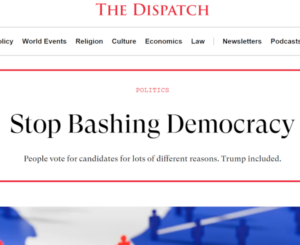Ich mache seit acht Jahren kein Hehl daraus, daß ich Donald Trump nicht für qualifiziert halte, Staats- und Regierungschef der mächtigsten Nation der westlichen Welt zu sein — vor allem charakterlich und aufgrund seines Temperaments — und bin daher von vielen meiner amerikanischen, evangelikalen Freunde kritisiert worden. Amerikanische Politik ginge mich nichts an, da ich weder US-Bürger wäre, noch in den USA wohnen würde. Ich habe dem immer — mehr uder weniger scharf — widersprochen und darauf beharrt, daß es mir sehr wohl zustünde, eine Meinung zur US-Politik zu haben und auch zu äußern, da Amerika als mächtigstes Land (zumindest der “westlichen” Welt) unser aller Leben mitbestimmt. Außerdem war ich zeitlebens ein Amerika-Fan, der nie vergessen hat, daß ich heute, ohne die maßgebliche Mitwirkung der USA, wahrscheinlich nicht in einem demokratischen Land leben würde , und auch nicht in einem, vom Marshall-Fund finanzierten Elternhaus aufgewachsen wäre, und daß mir daher das Schicksal dieses Landes sehr am Herzen liegt.
Leider hat in den letzten Jahren meine Begeisterung und Sympathie für das Land stark abgenommen, weil ich nicht nachvollziehen konnte, daß es ein Land von mit rund 300 Millionen Staatsbürgern, von denen etwas mehr als die Hälfte wahlberechtigt sind, bei den letzten drei Präsidentenwahlen keine besseren Kandidaten aufstellen konnte, als Hillary Clinton, Donald Trump, Joe Biden, und Kamala Harris — ein echtes Armutszeugnis. Und auch andere Schwachpunkse sind immer mehr in den Fokus gerückt: die Unfähigkeit, die Waffenpandemie und die daraus resultierenden Amokläufe in Schulen und anderswo einzudämmen, die Unfähigkeit, ein erschwingliches Gesundheitssystem gerade auch für die ärmeren und benachteiligteren Teile der Gesellschaft sicherzustellen, und die Häufung von rassistischen Übergriffen von Seiten der Polizei sind nur ein paar Beispiele dafür.
Auch von der evangelikalen Bewegung, die ein ganz wichtiger Einfluß auf mein Leben und meine Entwicklung hatte, bin ich sehr enttäuscht: Es ist mir unbegreiflich, wie rund 82 Prozent der amerikanischen Evangelikalen, ermutigt von vielen ihrer prominentesten Führungspersönlichkeiten, für einen vulgären Serien-Ehebrecher stimmen konnten, der damit prahlt, Frauen sexuell belästigt zu haben, seine politischen Gegner dämonisiert und seine entmenschlichende Verachtung gegenüber Menschen anderer Hautfarbe, Frauen, Menschen mit Behinderung, Mitgliedern der LGBT-Community und Einwanderern zur Schau stellt.
Ich habe mir bei alledem nie eingebildet, daß meine Ablehmung irgendeine Auswirkung auf den Ausgang der Wahl haben würde, und so kam es auch: Donald Trump hat die Wahl haushoch gewonnen, und wenn nichts unvorhersehbares geschieht, wird er vier Jahre lang als 47. Präsident die Geschicke der USA lenken, und damit auch sehr viel Einfluß auf die restliche Welt ausüben.
Ich bin Trump-Unterstützern sowohl unter meinen Freunden, aber vor allem auch untet christlichen Leitern, lange Zeit mit großem Unverständnis gegenübergestanden, und bei einigen meiner Freunde war ich stark versucht, den Kontakt abzubrechen. Ich habe jedoch meine Haltung diesbezüglich revidiert, vor allem was normale Wähler angeht — christlichen Leitern, die Trump’s charakterliche Defizite mit teils theologisch sehr skurrilen Argumenten beiseite wischen (Charakter ist offensichtlich nur beim politischen Gegner wichtig, nicht bei unseren eigenen Kandidaten) stehe ich nach wie vor sehr enttäuscht und kritisch gegenüber.
Dieser langwierige Prozess der Einstellungsänderung ist schwierig zu beschreiben und wohl auch noch nicht abgeschlossen, aber am Montag vor der Wahl, und dann drei Tage danach, bin ich auf ein paar Artikel gestoßen, die meine Überlegungen besser reflektieren, als ich sie selbst beschreiben könnte, und die mir auch noch einen weiteren Anstoß gegeben haben.
 Zunächst gab es am Montag im Nachrichtenmagazin profil einen Leitartikel von Robert Treichler mit dem Titel, “Amerika will träumen“, in dem er Trumps Attraktivität für die Wähler beschreibt:
Zunächst gab es am Montag im Nachrichtenmagazin profil einen Leitartikel von Robert Treichler mit dem Titel, “Amerika will träumen“, in dem er Trumps Attraktivität für die Wähler beschreibt:
Worin besteht das große Versprechen von Kamala Harris? Nein, ich meine nicht eine Liste von Vorschlägen aus allen möglichen Bereichen, sondern einen großen Gedanken, von dem sich 150 Millionen Menschen tief drin angesprochen fühlen können.
Ich fürchte, so einen gibt es nicht. Das einzige Thema, das Harris im Wahlkampf auf emotional aufrüttelnde Weise auf den Punkt gebracht hat, ist das Recht auf Abtreibung. Aber das ist keine übergreifende Idee für die ganze Nation.
Trump hat ein solches Versprechen: “Make America Great Again.” In diesem simplen Slogan, mit dem Trump den nunmehr dritten Wahlkampf bestritten hat, sind enorm viele Beweggründe enthalten, die ein politisches Lebensgefühl erzeugen. Der Wunsch nach Stärke, die Rückbesinnung auf alte, in Verruf geratene Vorstellungen, das Bekenntnis zur Rücksichtslosigkeit gegenüber Widersachern, der Trotz gegenüber moralisierenden Einwänden …
Trump verknüpft seine Parole mit seinen zahllosen charakterlichen Defiziten. Aber der Schwur, Amerika wieder großartig zu machen, überstrahlt offenbar immer noch alle Unsäglichkeiten.
 In der gleichen Ausgabe beantworten Siobhán Geets und Robert Treichler unter dem Titel, “Verstehen Sie Amerika?” 47 Fragen zur US-Präsidentenwahl. Hier ist der Beginn dieses Artikels:
In der gleichen Ausgabe beantworten Siobhán Geets und Robert Treichler unter dem Titel, “Verstehen Sie Amerika?” 47 Fragen zur US-Präsidentenwahl. Hier ist der Beginn dieses Artikels:
Würden Sie bei einer Präsidentenwahl eher für eine schwarze Frau stimmen oder für einen wegen sexuellen Missbrauchs verurteilten Mann, der zudem im Verdacht steht, sich des versuchten Wahlbetrugs und der Anstiftung zu einem Aufstand schuldig gemacht zu haben? Durchaus möglich, dass Sie nicht lange nachdenken müssen. Die kniffligere Frage lautet: Warum hat der oben genannte verurteilte Straftäter – Sie haben ihn längst erkannt, es handelt sich um Donald Trump – am kommenden Dienstag gute Chancen, zum 47. Präsidenten der Vereinigten Staaten gewählt zu werden?
Die anhaltende Popularität und der politische Erfolg Trumps machen ratlos. Doch es gibt Erklärungen: Es ist eine Tatsache, dass Trump frühzeitig das Problem der illegalen Migration erkannt und daraus ein politisches Megathema geschmiedet hat, ähnlich wie rechte Parteien in Europa. In seinem unnachahmlichen Stil grotesker Übertreibungen verteufelt er Migranten als Mörder, Vergewaltiger, und er verstieg sich gar zu der Behauptung, Einwanderer aus Haiti würden „die Haustiere anderer Leute essen“. Dennoch: Auch wenn die Demokraten seither restriktive Maßnahmen gegen illegale Einwanderung verhängen, gesteht ihnen ein großer Teil der Bevölkerung keinerlei Glaubwürdigkeit bei diesem zentralen Thema zu.
Dazu kommt die politisch aufgeladene Frage der Identitätspolitik. Die Demokraten kämpfen für Diversität, LGBTQ-Rechte und das Recht auf Abtreibung. John Della Volpe, Direktor am Harvard Kennedy Institut für Politik und früherer Berater von Joe Biden, warnt, dass sie damit die Männer vernachlässigen. Diese wenden sich prompt wieder stärker den Republikanern zu, die ein unbeschwertes Rollenbild mit eingeschränkter Nachsicht gegenüber patriarchalischen und sexistischen Verhaltensweisen propagieren. Dass die eine Hälfte der Bevölkerung etwas anderes will als die andere, ist völlig normal.
Problematisch ist jedoch, dass die beiden Hälften einander auf keiner Ebene mehr zu begegnen scheinen – nicht einmal im übertragenen Sinn. Trumps Anhänger halten die Wahl 2020 für geschoben, nehmen die Richtersprüche nicht ernst, schlagen die Warnungen seiner ehemaligen Mitarbeiter, wonach Trump gefährlich oder gar ein Faschist sei, in den Wind. So gehen alle Vorwürfe der Gegenseite ins Leere.
Auch wenn Trump selbst haarsträubende Dinge sagt, wie etwa, dass es gegen die „Feinde von innen“ – also seine Widersacher innerhalb der USA – mithilfe des Militärs vorgehen wolle, tun das seine Anhänger als typische Übertreibung ab. Während sich die andere Hälfte des Landes vor Entsetzen schaudert.
Ähnliche Überlegungen im Lauf der letzten Monate haben dazu geführt, daß ich versuche, normale Trump-Wähler besser zu verstehen und ihnen mit mehr Toleranz zu begegnen.
 Am Freitag nach der Wahl landete schießlich der aktuelle Newsletter von Jonah Goldberg in meiner Inbox, mit dem Titel, “Stop Bashing Democracy!” (“Hört auf, die Demokratie schlechtzureden!”), in dem er unter anderem schreibt,
Am Freitag nach der Wahl landete schießlich der aktuelle Newsletter von Jonah Goldberg in meiner Inbox, mit dem Titel, “Stop Bashing Democracy!” (“Hört auf, die Demokratie schlechtzureden!”), in dem er unter anderem schreibt,
Und das ist im Kern der schwerwiegende Fehler, den die Menschen machen. Menschen wählen Kandidaten—irgendeinen Kandidaten—aus den unterschiedlichsten Gründen. Wenn du denkst, dass Trump ein Faschist ist, in Ordnung. Darüber können wir reden. Aber nur weil du ihn für einen Faschisten hältst, bedeutet das nicht, dass jemand, der für ihn gestimmt hat, dir zustimmt und trotzdem für ihn gestimmt hat. Ich kenne Dutzende Menschen, die für Trump gestimmt haben. Keiner von ihnen ist ein Idiot oder ein Faschist oder ein faschistischer Idiot.
Dieses Argument funktioniert genauso in die andere Richtung. Du magst denken, dass Kamala Harris eine „Kommunistin“ oder „Marxistin“ ist usw. Ob sie es ist oder nicht, ist ein diskutierbares Thema, im Sinne davon, dass es diskutiert werden kann. Aber wenn du möchtest, dass die Leute dir zustimmen, musst du das Argument bringen und nicht nur die Anschuldigung aussprechen. Wenn du sicher bist, dass sie eine Kommunistin ist, kann dir niemand das Recht nehmen, das zu sagen—aber zu sagen, dass es so ist, bedeutet nicht, dass alle dir zustimmen müssen. Nur sehr wenige der 68 Millionen Menschen, die für Harris gestimmt haben, taten dies, weil sie dachten, sie sei eine Marxistin oder Kommunistin.
Ich bin natürlich immer noch der Meinung, daß ich mit meiner Einschätzung von Donald Trump recht habe, und Trumps Unterstützer verkehrt liegen, aber ich habe inzwischen mehr Verständnis für sie, vor allem, da mit Kamala Harris (genauso wie vor acht Jahren mit Hillary Clinton) nur eine marginal weniger problematische Kandidatin zur Wahl stand.
Und damit springe ich jetzt zurück über den Atlantik, in unser Land Österreich. Vieles, was Robert Treichel und Siobhán Geets schreiben, läßt sich fast eins zu eins auf unsere Sitiation anwenden, wo mit Herbert Kickl ein meiner Meinung nach absolut ungeeigneter Kandidat bei der Nationalratswahl die meisten Stimmen gewonnen hat. Zum Glück hat er keine regierungsfähige Mehrheit erhalten, und niemand will mit ihm koalieren, sodaß eine gute Chance besteht, daß wir eine Koalitionsregierung, aus ÖVP und SPÖ, möglicherweise mit den NEOS, bekommen werden.
Aber es Eines ist klar: wenn die neue Regierung so weitermacht, wie bisher, dann wird Kickl in vier Jahren noch mehr Stimmen, und möglichetweise eine “Absolute”. bekommen und dann regieren. Sich auf die dummen Wähler auszureden wird dann auch nicht mehr helfen. Denn das Problem ist hier bei uns das gleich wie auch in Amerika (und vielen anderen Ländern): eine politische Klasse= eine Möchtegern-Elite, die zu sehr ihren eigenen Interessen und ideologischen Lieblingsthemen verpflichtet ist, um sich um die Sorgen und Ängste von normal sterblicher Bürger zu kümmern. Das mag in Aerika und bei uns andere Formen annehmen, aber im Kern ist es dasselbe.
Fußnoten:
-
- geschätzte Zahlen aus 2020 ↩️
- Robert Treichler wurde 1968 in Graz geboren, studierte Französisch und Philosophie und ist seit 1997 Journalist beim Nachrichtenmagazin profil, seit 2021 in der Funktion des stellvertretenden Chefredakteurs. Bei Zsolnay erschien 2024 gemeinsam mit Gernot Bauer das Buch “Kickl und die Zerstörung Europas”. ↩️
- Siobhán Kathleen Geets, geboren 1984 in Wien. Studium der Kultur- und Sozialanthropologie an der Universität Wien, Fokus auf Genderstudies, Internationale Entwicklung, Philosophie and Religionswissenschaften. Diplomarbeit über Ladyboys in Thailand, Verleihung des akademischen Grades im Mai 2008. Von Oktober 2008 bis September 2009 Besuch des Lehrgangs an der Fotoschule Wien. Jänner bis Februar 2008 sowie Februar bis März 2009 Feldforschung in Thailand, Interviews mit Ladyboys für Diplomarbeit und Radio-Feature für Ö1. Seit 2020 bei profil im Außenpolitik-Ressort. ↩️

 First, there was a lead article in the news magazine
First, there was a lead article in the news magazine  In the same issue,
In the same issue,  Finally, three days after the election
Finally, three days after the election